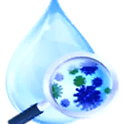
DISEASE DETECTIVES


Plants used for pollination by birds and bees are affected by increased chlorination in soil
We connected with team Hi-Tech to look at the different plants that are used for pollination by birds and bees species. We looked at how they can be affected by increased chlorination due to chlorine released by road salts which leads to damage to vegetation and soil. This is done through Na+ replacing the cations present in soil, such as K+, Ca+, Mg+ etc., mobilizing them so they can enter water bodies and change the nutrient cycles (Tiwari & Rachlin, 2018).
Microalgae-based technology
We also found that antibiotics and road salts affect species in coastal wetlands, therefore we can use biotechnology to assist us in measuring and monitoring these pollutants relating to their overall advanced ecology topic of Biotechnology Ecology.
Our team's research showed that the use of traditional technologies such as activated sludge processes were not effective for the removal of antibiotic pollutants from wastewater (Leng et al., 2020). We found that this novel microalgae-based technology can be used as an effective alternative to the treatment of wastewater containing antibiotics. When exposed to antibiotics, these microalgae utilize processes of adsorption, accumulation, biodegradation, photodegradation and hydrolysis to remove toxic antibiotics from wastewater (Leng et al., 2020). Some of the potential advantages to the use of this technology is CO2 fixation, contaminant removal, saving nutrients input and potentially developing algae-derived products (Leng et al., 2020).
References
Leng, L., Wei, L., Xiong, Q., Xu, S., Li, W., Lv, S., Lu, Q., Wan, L., Wen. Z., & Zhou, W. (2020). Use of
microalgae based technology for the removal of antibiotics from wastewater: A review. Chemosphere, 238, 124680. https://doi.org/10.1016/j.chemosphere.2019.124680
Tiwari, A., & Rachlin, J. W. (2018). A Review of Road Salt Ecological Impacts. Northeastern Naturalist, 25(1), 123-142. doi:10.1656/045.025.0110